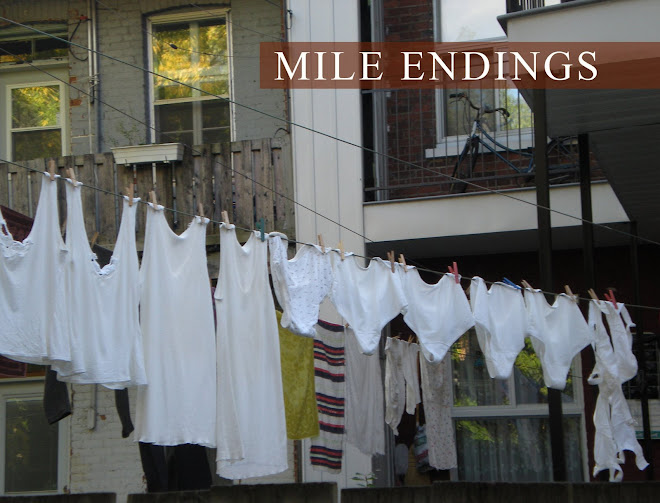
On a recent rainy Friday, the door stood open at Riddell's Fishing Tackle at 55 Bernard St. West. People carried bags of lures and armloads of mounted fish heads out of the musty store.
I hadn't expect Mile End's most eccentric storefront to stay intact forever, but at the same time, it sort of seemed it should. It was a neighbourhood fixture, a dusty shrine to fish and fishing.
Just the other day, I'd walked past to see if the window display was still there. A young couple was looking at the spill of sand studded with lures and driftwood, and the mosaic of yellowed photographs and clippings taped to the glass.
"Wow!" they exclaimed at the discovery of this strange museum.
The store's owner, George Riddell, died in June at the age of 82.
Riddell taught himself to fish as a hungry kid during the Depression. He started his business on Bernard Street in 1960. The rent was $50 a month. For the next fifty years, it was his lair. There he sat, with an ever-present bottle of beer, making his lures, holding forth on fishing, and, after he'd made a big catch, it was where he dispensed free fish to neighbours who needed it.

Since the mid-seventies, it was his home, too. Rumour has it that one night when the store was broken into, the white-bearded Riddell, naked and yelling, chased the robbers out into the street.
Inside, it was obvious that I wasn't the only one who'd been keeping an eye on the place for the past few months. There were Riddell family members; friends, neighbours, and former customers; and a few wild-eyed collectors who used flashlights to comb the store's stock for treasure.
"We have to clear it all out by Sunday," said George's nephew Michael who'd flown in from England to help sort things out. "What could a dusty stuffed fish sell for?" he mused , shaking his head at a large specimen on the wall.
"He wasn't supposed to live here," George's niece Linda told me. She pointed to the store's tiny back room, the walls yellowed with half a century of cigarette smoke. "But he lived the life he wanted, and died the way he wanted."
She described her uncle as a loner, camper and fisherman who had a tough upbringing, and only completed grade two in school. As a kid, she saw him as a hero on a motorcycle. "He was artsy and had a sense of humour. You can tell by the stuff he made."

On the walls, George's hand lettered signs announced his handmade lures-cum-folk art: "Super Spin by Riddell" or "Blade Silver Old Time Troll by Riddell."
"We've all taken a few lures," said Linda. "Everybody in the family wanted one."
Riddell collected Asian and African face masks, possibly as a source of inspiration for the lures he made. He also stocked commercial lures.
"He made all the crazy looking ones," said Ottoleo who was wearing a necklace made of silver lures. "They're one of a kind. You'll never find them again. They have little fishy moves to them, he tested them in this tank."
A tank labeled "Riddell Lure Testing Tank" ran along one of the store's walls.

"He made that one out of a toaster," said Gaetan, Riddell's upstairs neighbour and friend, pointing to a squiggle of chrome.
Ottoleo, 23, said he caught his first fish at the age of three and used to come in to swap stories and tips with George. "He taught me how to make my own stuffed fish for mounting. You pack it with salt, set it in the sun. It works! I was going to bring mine in to show him, but he passed away. "
He filled up his knapsack, from which two newly acquired fishing rods protruded. "I'm so excited. Two hundred dollars worth of Riddell lures. This will last for the rest of my life!"
"He's a real fisherman so we're giving him a much better price than those guys," Michael told me, in a low voice, referring to the collectors. "Notice the fervent interest in the stuffed fish," he added dryly, as they remained unsold on the walls.
It seemed everything else was likely to be snapped up, including a press to make sinkers or weights for lures and old packets of made-in-France fish hooks.
This was a lot of activity for Riddell Fishing Tackle. The dark interior had attracted few visitors in recent years although one neighbour told me that despite his failing health, Riddell had opened the store on Saturday mornings until the end.
When I walked past the store, it never occurred to me that he was living in there, behind the closed door, in the dark.
 Things have a way of changing, or disappearing, when you're not looking. That's when you realize you never paid enough attention while they were there.
Things have a way of changing, or disappearing, when you're not looking. That's when you realize you never paid enough attention while they were there.I should have ventured in more than one time, on a summer afternoon about 17 years ago, when we bought lures to bring along on a camping trip.
A few days after the closing-out sale, the store windows stood empty except for a few pieces of wood. A new piece of paper taped to the window said: "Uncle George Riddell, 1928-2010. Thanks for the memories. Gone Fishing."
A couple days later, that too, was gone.

For more on George Riddell, see Alex Roslin's interview with him here.



